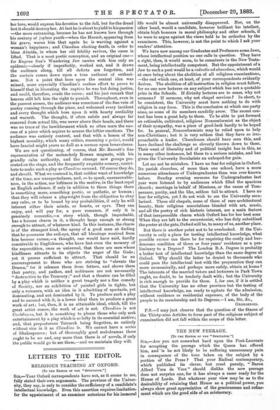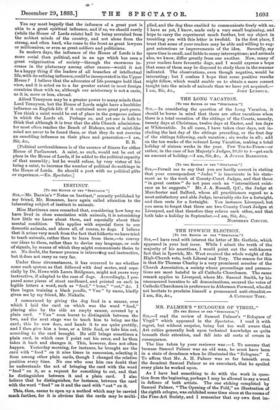THE NEW PEERAGE.
[To THE EDITOR OF THE " SPECTATOR."] Sza.,—Are you not somewhat hard upon the Poet-Laureate for accepting the peerage which the Queen has offered him, and "is he not likely to be suffering unnecessary pain in consequence of the tone taken on the subject by a portion of the Press ? That your Radical contemporary, which published its clever, but cruel parody, " Baron Alfred Vere de Vere " should dislike the new peerage does not surprise one, for it has always a sneer ready for the House of Lords. But whatever your view may be as to the desirability of retaining that House as a political power, you always show great appreciation of the graciousness and refine- ment which are the good side of an aristocracy.
You say most happily that the influence of a great poet is akin to a great spiritual influence, and if so, we should surely (while the House of Lords exists) hail its being recruited from the noblest minds of the country, and not alone from the strong, and often hard, who come to the front as great lawyers or millionaires, or even as great soldiers and politicians.
In modern days, the influence of the House of Lords is far more social than political, and in an age which has seen a great vulgarisation of society—through the enormous in- crease in the plutocracy among other causes—would it not be a happy thing if the leaders of all branches of intellectual life, with its refining influence, could be incorporated in the Upper Howe P I believe that the advocates of life-peerages hold that view, and it is acted on to a far greater extent in most foreign countries than with us, although our aristocracy is not a caste, as it is, more or less, abroad.
Alfred Tennyson may be a greater power to many minds than Lord Tennyson, but the House of Lords might have a healthier influence on English life if it contained more great poet-peers. You think a saint would be out of place in the gorgeous palace in which the Lords sit. Perhaps so, and yet one is loth to think that although it is true that the able Church administra- tor most often reaches the Bench of Bishops, men of saint-like mind are never to be found there, or that they do not exercise an ennobling influence on their place and generation.—I am,
Sir, &c., E. B. [Political serviceableness is of the essence of fitness for either House of Parliament. A saint, as such, would not be out of place in the House of Lords, if he added to the political capacity of that assembly ; but he would refuse, by very virtue of his being a saint, to increase the number of political do-nothings in the House of Lords. So should a poet with no political gifts or experience.—En. Spectator.]



































 Previous page
Previous page